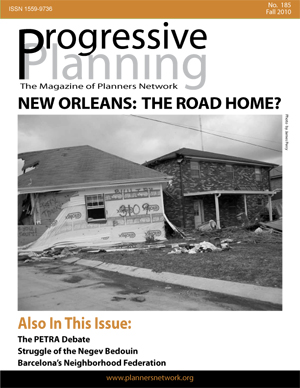The Preservation Enhancement and Transformation of Rental Assistance Act of 2010 (PETRA), now known as the Rental Housing Revitalization Act of 2010 (or PETRA III), is the subject of a feature story in the Fall 2010 issue of Progressive Planning Magazine (P.P.M.), the key publication of the Planners Network.
Highly-respected U.S. planners and P.P.M. editors – Tom Angotti of Hunter College in New York City and Marie Kennedy of University of Massachusetts in Boston take a look at the on-going debate and strongly warn that this is a watershed moment in neoliberal politics that we should not and cannot take lightly. Read it at plannersnetwork.org: "Selling Off Public Housing: PETRA and the Neoliberal Agenda Alarm, Debate and Confusion over Obama Administration Public Housing Policy."
Article excerpt from Peter Marcuse, of Columbia University, copied below:
"PETRA Is an Awful Proposal
PETRA justifies every bit of the knee-jerk reaction to privatization as expensive, regressive, undemocratic and dangerous to the provision of public services.
PETRA is Expensive: Public housing today maintains and improves its own property with either a publicly employed staff under direct public supervision, or by contracting out specific maintenance work, generally on a bid basis to the lowest bidder, and, in any event, supervised directly by the public housing authority’s own professional staff. Private profits are directly controlled by the public. Financing is through public bonding, available at the lower interest rates that government is able to pay. The inadequacies of present maintenance and improvements are the result of inadequate funding, not incompetence, profit-seeking or greed. Increased tenant participation would be a big help, and is being extensively discussed and promoted by tenants’ groups and advocates.
Under PETRA, a private owner would undertake all maintenance and improvement functions in whatever way it sees fit, to whatever standard it sees fit, with only minimal public supervision and no incentive to economize. Costs must be paid out of rents; if they are excessive, rents have to be increased, and the program provides justification for such increases if they are accompanied by increases in market value, which improvements generally produce. Financing is to be secured in the private market, that is, at commercial rates, rather than the lower rates government can obtain. Either tenants are faced with increased, and likely unaffordable, rents, or subsidies are provided out of the public treasury to meet the costs. Incentives go the wrong way: private desire for higher profits drives up costs, and there is no incentive to hold down occupant rents or comparable “market rents.”
There is indeed the possibility under the proposal that HUD itself would bid on its own public housing when it is put up for sale, but it would have to operate it as Section 8 project-based housing. That means it would operate under market constraints, which would include the ongoing temptation to increase rents and cherry-pick tenants or (and the proposal gives HUD discretion in the matter) release units from low-income requirements and rent them at market prices.
PETRA Is Regressive. Public housing today has eligibility requirements that limit occupancy to those of low income. It requires rents from tenants that are limited to a percentage of their income, regardless of the actual cost of operation. Rents are held down by public subsidies. While it is a constant struggle (and often a partially losing one) to secure subsidies adequate to the task, residents are not forced to cover deficits out of their own limited incomes; the rent-to-income ratios are held to a minimum. Such subsidies as there are inure to the benefit of the low-income residents.
The whole spirit of PETRA is to yoke the drive of the private sector to make a profit on the provision of housing for poor tenants. That creates an inherent conflict of interest: the more tenants pay, the more private landlords make. Along the way, banks are well taken care of. If a landlord can arrange for the replacement of low-income tenants by higher income tenants, and thus charge a higher rent, the landlord will do so, making public housing that much less progressive. The higher costs come from the need to make profits all along the way, by the new private owners, their contractors and the banks profiting from their borrowing."

